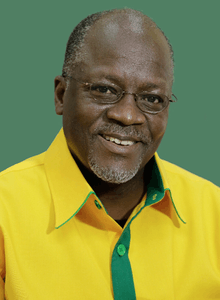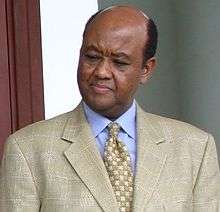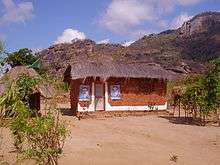Chama Cha Mapinduzi
The Chama Cha Mapinduzi (CCM; English: "Party of the Revolution") is the dominant ruling party in Tanzania and the second longest-ruling party in Africa, only after National Party of South Africa.[2][3] It was formed in 1977, following the merger of the Tanganyika African National Union (TANU) and the Afro-Shirazi Party (ASP), which were the sole operating parties in mainland Tanzania and the semi-autonomous islands of Zanzibar respectively.
 | |
| Abbreviation | CCM |
| Chairman | John Magufuli |
| Secretary-General | Bashiru Ally |
| Spokesperson | Humphrey Polepole |
| Vice chairman | Philip Mangula |
| Founder | Julius Nyerere Aboud Jumbe |
| Founded | 5 February 1977 |
| Merger of | TANU and ASP |
| Headquarters | Dodoma |
| Newspaper | Uhuru |
| Student wing | Shirikisho la Wanafunzi wa Taasisi za Elimu ya Juu |
| Youth wing | Umoja wa Vijana wa CCM |
| Women's wing | Umoja wa Wanawake Tanzania |
| Parents' wing | Wazazi |
| Membership (2013) | 8.4 million[1] |
| Ideology | Social democracy Historical: Ujamaa African socialism |
| Political position | Centre-left Historical: Left-wing to far-left |
| International affiliation | Progressive Alliance |
| African affiliation | FLMSA |
| Colours | |
| Bunge | 287 / 393
|
| Zanzibar HoR | 81 / 85
|
| EALA | 7 / 9
|
| SADC PF | 4 / 5
|
| Pan-African Parliament | 4 / 5
|
| Election symbol | |
| A hoe and a hammer | |
| Website | |
| Political Party Website | |
TANU and its successor CCM have ruled Tanzania uninterruptedly since independence. Since the creation of a multi-party system, CCM has won the past five general elections in 1995, 2000, 2005, 2010 and 2015. Jakaya Kikwete, its presidential candidate in 2005, won by a landslide, receiving more than 80% of the popular vote. In the 2010 election, it won 186 of the 239 constituencies, continuing to hold an outright majority in the National Assembly.[4]
History
The party was created on February 5, 1977, under the leadership of Julius Nyerere, through the merger of the Tanganyika African National Union (TANU), the ruling party in Tanganyika, and the Afro-Shirazi Party (ASP), the ruling party in Zanzibar.
TANU/CCM has dominated the politics of Tanzania since the independence of Tanganyika in 1961. Due to the merger with the ASP, from 1977 it has also been the ruling party in Zanzibar, though there its grip on power has been more contested by the Civic United Front (CUF).
From its formation until 1992, it was the only legally permitted party in the country. Every five years, its national chairman was automatically elected to a five-year term as president; he was confirmed in office via a referendum. At the same time, voters were presented with two CCM candidates for the National Assembly or Bunge. This changed on July 1, 1992, when amendments to the Constitution and a number of laws permitting and regulating the formation and operations of more than one political party were enacted by the National Assembly.
Ideology
Originally a champion of African socialism, upholder of the system of collectivized agriculture known as Ujamaa and firmly oriented to the left, the CCM espouses today a more social-democratic approach. CCM hopes to continue to modernize in order to ensure:
- Increased productivity which would boost the country's revenue
- Increased employment and improved management
- Acquisition of new and modern technology
- Increased and expanded local and international markets for our products, and;
- Improved and strengthened private sector serving as the engine of the national economy while the government sharpens its focus on provision of social services, infrastructure, security and governance of the state.
Similarly, the CCM's major foreign policy focus is economic diplomacy within the international system, and peaceful coexistence with neighbors.
Electoral performance
The CCM has a leading role in society.[5]
The party has won all presidential elections at both the national level and in Zanzibar at the autonomous level under the multi-party system: 1995, 2000, 2005, 2010 and 2015. It also dominates the legislature.
In the elections for Zanzibar's presidency and House of Representatives, held on 30 October 2005, incumbent president and CCM candidate Amani Abeid Karume won with 53.18% of the vote, while the party won 30 seats out of 50.
In the national elections for Tanzania's presidency and National Assembly, held on 14 December 2005, Foreign Minister and CCM candidate Jakaya Kikwete won with 80.28% of the vote. Out of the 232 seats filled through direct election, the CCM won 206.
On 31 October 2010, Jakaya Kikwete was reelected president with 62.8% of the vote, while CCM obtained 186 out of the 239 directly elected seats.
On 30 October 2015 John Magufuli of CCM won the election with 58.46% of the vote.
CCM was admitted into the Socialist International as a full member at the SI's spring congress on 4–5 February 2013.[6]
Leadership
Current leaders
John Magufuli was elected Party Chairman on July 23, 2016 and took over for Jakaya Kikwete, who had been serving since November 2012.
National leaders
- Chairman: John Magufuli
 John Pombe Magufuli, the National Chairman and the President of United Republic of Tanzania
John Pombe Magufuli, the National Chairman and the President of United Republic of Tanzania - Vice Chairman Zanzibar: Ali Mohamed Shein
- Vice Chairman Mainland: Philip Mangula
- Secretary General: Dr Bashiru Ally
- Deputy Secretary General Zanzibar: Dr Abdalla Juma
- Deputy Secretary General Mainland: Rodrick Mpogolo
- Secretary for Organisation: Perreira Silima
 Abdulrahaman Kinana, former Secretary General for the Chama Cha Mapinduzi
Abdulrahaman Kinana, former Secretary General for the Chama Cha Mapinduzi - Secretary for Party Ideology and Publicity: Humphrey Polepole
- Secretary for Party Affairs and International Relations: Rtd Colonel Ngemela Lubinga
- Secretary for Economic Affairs and Finance: Dr Frank Haule
 The party has a strong political base in rural Tanzania.
The party has a strong political base in rural Tanzania.
_a_Dodoma_(Tanzania).jpg)
.jpg)
- National Chairman
| Name | Tenure |
|---|---|
| Julius Nyerere | 1977–1985 |
| Ali Hassan Mwinyi | 1986–1995 |
| Benjamin Mkapa | 1996–2005 |
| Jakaya Kikwete | 2006–2016 |
| John Magufuli | 2016– |
- National Vice Chairman (Mainland)
| Name | Tenure |
|---|---|
| John Malecela | |
| Pius Msekwa | 2007–2012 |
| Philip Mangula | 2012–present |
- National Vice Chairman (Zanzibar)
| Name | Tenure |
|---|---|
| Salmin Amour | |
| Amani Abeid Karume | ? – 2012 |
| Ali Mohamed Shein | 2012–present |
- Secretaries General
| Name | Tenure |
|---|---|
| Pius Msekwa | 1977–1982 |
| Rashidi Kawawa | 1982–1990 |
| Horace Kolimba | 1990–1995 |
| Lawrence Gama | 1995–1997 |
| Philip Mangula | 1997–2007 |
| Yusuf Makamba | 2007–2011 |
| Wilson Mukama | 2011–2012 |
| Abdulrahman Kinana | 2012–May 2018 |
| Bashiru Ally | 2018 - present |
Electoral history
Presidential elections
| Election | Party candidate | Votes | % | Result |
|---|---|---|---|---|
| 1980 | Julius Nyerere | 5,570,883 | 95.5% | Elected |
| 1985 | Ali Hassan Mwinyi | 4,778,114 | 95.68% | Elected |
| 1990 | 5,198,120 | 97.78% | Elected | |
| 1995 | Benjamin Mkapa | 4,026,422 | 61.82% | Elected |
| 2000 | 5,863,201 | 71.74% | Elected | |
| 2005 | Jakaya Kikwete | 9,123,952 | 80.28% | Elected |
| 2010 | 5,276,827 | 62.83% | Elected | |
| 2015 | John Magufuli | 8,882,935 | 58.46% | Elected |
National Assembly elections
| Election | Votes | % | Seats | +/– | Position | Government |
|---|---|---|---|---|---|---|
| 1980 | 5,417,099 | 100% | 264 / 264 |
Sole legal party | ||
| 1985 | 4,768,997 | 100% | 274 / 274 |
Sole legal party | ||
| 1990 | 5,198,120 | 97.78% | 264 / 264 |
Sole legal party | ||
| 1995 | 3,814,206 | 59.22% | 214 / 285 |
Supermajority government | ||
| 2000 | 4,628,127 | 65.19% | 243 / 285 |
Supermajority government | ||
| 2005 | 7,579,897 | 70% | 264 / 324 |
Supermajority government | ||
| 2010 | 4,641,830 | 60.20% | 259 / 350 |
Supermajority government | ||
| 2015 | 8,021,427 | 55.04% | 252 / 367 |
Supermajority government |
References
- "Kikwete deplores divisive politics". Daily News (Tanzania). 4 February 2013. Archived from the original on 7 February 2013. Retrieved 4 February 2013.
- O'Gorman, Melanie (26 April 2012). "Why the CCM won't lose: the roots of single-party dominance in Tanzania". Journal of Contemporary African Studies. 30 (2): 313–333. CiteSeerX 10.1.1.410.9369. doi:10.1080/02589001.2012.669566.
- Manson, Katrina (30 September 2013). "Three issues loom over Tanzania's political scene". Financial Times. Retrieved 8 September 2014.
- Dagne, Ted (31 August 2011). "Tanzania: Background and Current Conditions" (PDF). Congressional Research Service. Retrieved 5 September 2013.
- O'Gorman, Melanie (2012). "Why the CCM won't lose: The roots of single-party dominance in Tanzania". Journal of Contemporary African Studies. 30 (2): 313–333. doi:10.1080/02589001.2012.669566. S2CID 17134713.
- "Decisions of the Council" (PDF). Socialist International. February 2013. Retrieved 14 September 2014.